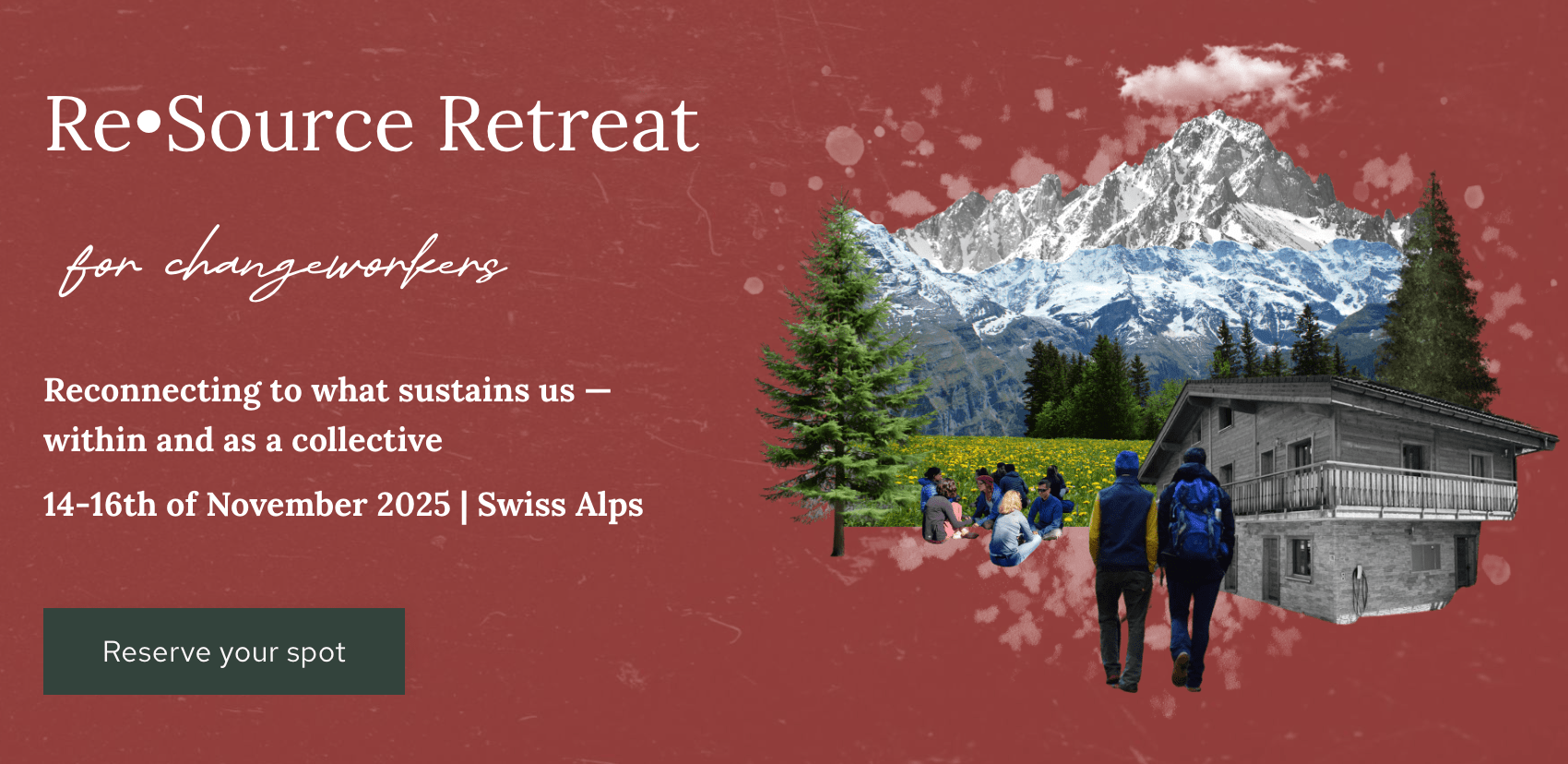What ancient Swiss waterways can teach us about caring for the commons
Oct 16, 2025
One of the reasons I didn’t adopt ‘social innovator’ as a term to describe myself, even though I studied the MSt in Social Innovation at the University of Cambridge, is because from my point of view what we need is often not at all innovation.
(If you have never heard the term social innovation before, here’s the definition of Professor Neil Stott and Paul Tracy, who are the co-directors of the Cambridge Centre for Social Innovation: the development of creative and practical solutions to complex social and environmental problems.)
What we can learn from the past about innovation
Sure, in some cases we need ‘innovation’. We need new materials to replace plastic, regenerative energy sources and new medicine. But often, we need to stop doing something we started just a couple decades ago, or do less of the thing altogether.
For example, throw-away culture is such a recent invention! Single-use plastics have only taken over the world since the late 70s… (here is an UNEP article about the history of the plastic shopping bag, called ‘from birth to ban’). And look at the crisis this created, where we can’t even study the effects of microplastics on humans because they can’t find a control group.
We tend to forget, but ‘circular economy’ is not a revolutionary idea - in many fields it’s just how things used to be done, until the industry found a way that was more profitable for them (and in some cases willingly, knowingly sacrificed literally everyone and everything else).
I digress. My point is that the work of changing systems and shifting paradigms is sometimes about ‘innovating’, but it very often is about remembering. Deconditioning ourselves from ‘Western’ narratives and paradigms such as linearity or the patriarchy. Finding our way back to ancestral wisdom and ways of being that are healthier for us as individuals, and don’t destroy the ecosystems we depend on.
One example is the tragedy of the commons, “the concept that, if many people enjoy unfettered access to a finite, valuable resource, such as a pasture, they will tend to overuse it and may end up destroying its value altogether.” Sounds familiar?
But it doesn’t have to be this way. Many of our ancestors knew how to live in balance with nature, as part of ecosystems, and manage shared resources without turning self-destructive. In Switzerland for instance, folks living in the Alps had figured out a way to manage the scarce resource of water in a collective way.
The wisdom of ancient Swiss waterways
Dating as far back as the 1400s, the local community collectively managed the region's bisses, historic irrigation channels delivering precious water from mountain streams, often through treacherous routes. If you’d like to visit them or see more images, you can do so by clicking here.
Elinor Ostrom came to Switzerland in the 1980s as a researcher and what she found there led to develop her thinking around the commons. She co-won the 2009 Nobel Economics Prize for this by the way, though she wasn't a professor of economics but of political science (and as the only woman to have won the award).
But how did they do it? In short, even though there was no owner, everyone could take from the stream in return for putting in a few days of maintenance work each year, and there were substantial penalties for infractions.
Out of the research she has done, Ostrom defined these 8 principles:
- Define clear group boundaries.
- Match rules governing use of common goods to local needs and conditions.
- Ensure that those affected by the rules can participate in modifying the rules.
- Make sure the rule-making rights of community members are respected by outside authorities.
- Develop a system, carried out by community members, for monitoring members’ behavior.
- Use graduated sanctions for rule violators.
- Provide accessible, low-cost means for dispute resolution
- Build responsibility for governing the common resource in nested tiers from the lowest level up to the entire interconnected system.
Even Hardin eventually acknowledged that the problem is not collective ownership per se, but the lack of rules governing access and use. Still, the story of the ‘disaster of the commons’ prevails in many people’s minds, and in how we observe reality today.
So how can remembering this help us? Knowing that we used to have this knowledge and these practices helps challenge the narrative that “this is just how humans are”. As long as we live within the narrative of greed, selfishness and inevitable doom, there is no way for us to break out of it. How could we?
We need to lean on our ancestral knowledge to recall that this is not all human beings are. That we are also cooperative, social beings who thrive in communities, and are not too stupid or short-term oriented to manage their shared resources properly.
Reviving the spirit of the commons today
I also find a lot of use in Ostrom’s principles when looking at communities, organisations and teams. How often do you have a situation where one or several people are just free-riders, at the cost of everyone else? So many projects I’ve observed struggle with this. It’s not just the group work in school, this pattern continues into adulthood.
Or take this one: “Develop a system, carried out by community members, for monitoring members’ behavior.” How often do you find that the rules are carried out in this way? That responsibility is held collectively? Often I see a control structure which is top down, or when attempting to do it collectively the whole project or organisation eventually breaks down because no one wants to be the ‘bad guy’, the person holding others accountable.
I speak from own (painful) experience here, from seeing this happen in real time and then ending up serving as a scapegoat when you do speak up, as an issue that was harming everyone is suddenly turned into a ‘personal conflict’ between the person who was not doing their job or carrying their fair share and the person who spoke up. This would not happen if there truly was a system that is held collectively.
Or this one: “Provide accessible, low-cost means for dispute resolution.” What this could translate to in an organisational context or a community would be something like a conflict resolution process, and a place to not just raise concerns but have the collective hold the process of addressing the concerns. If we developed these skills once more, I do think there would be much less gossip and general dissatisfaction in our collectives…
This wisdom, translated through academia, but based on the embodied knowledge of our ancestors, is highly relevant today. To challenge the narrative, and to guide the way forward.
I have been inspired by this story and Ostrom’s work for many years, so it’s really fitting that in our upcoming retreat (the first of its kind!) we will go visit the Bisses together.
Here’s the happy news: in exactly one month, we will co-host a regenerative retreat together with our partner organisations TransfomAction Lab and One Planet Lab in the Swiss Alps 😍
When the world feels heavy, it’s easy to forget that rest and reflection are an integral part of changework. So for just a week-end, we invite you to pause — to refill our wells, remember our why, and reconnect with the deeper current that sustains us.
Think nature, nourishing shared meals, inspiring conversations and deep reflection. Plus inspiration from our ancestors through a visit to the local bisses, and a joint exploration of how this legacy may inform our continued journey. If this resonates, it would be a pleasure to have you with us!
Check out the Re•Source Retreat →
If you’ve come so far: if you have a story about ancestral wisdom that can guide us in these times or a practice you’re currently reclaiming, I’d love to hear ☺️ We also welcome guest blogs on this topic!
Applications now open
The Harvest Lab
8-week guided journey for changeworkers, thought leaders, educators, and visionaries ready to shape their lived experience into aligned offerings — and to do it in a way that feels regenerative, not depleting.
Subscribe to The Changework Journal
Get first access to new offers, free or discounted tickets to events Nora speaks at, exclusive access to funding opportunities we source from our network (not shared anywhere else on our channels), and more!



